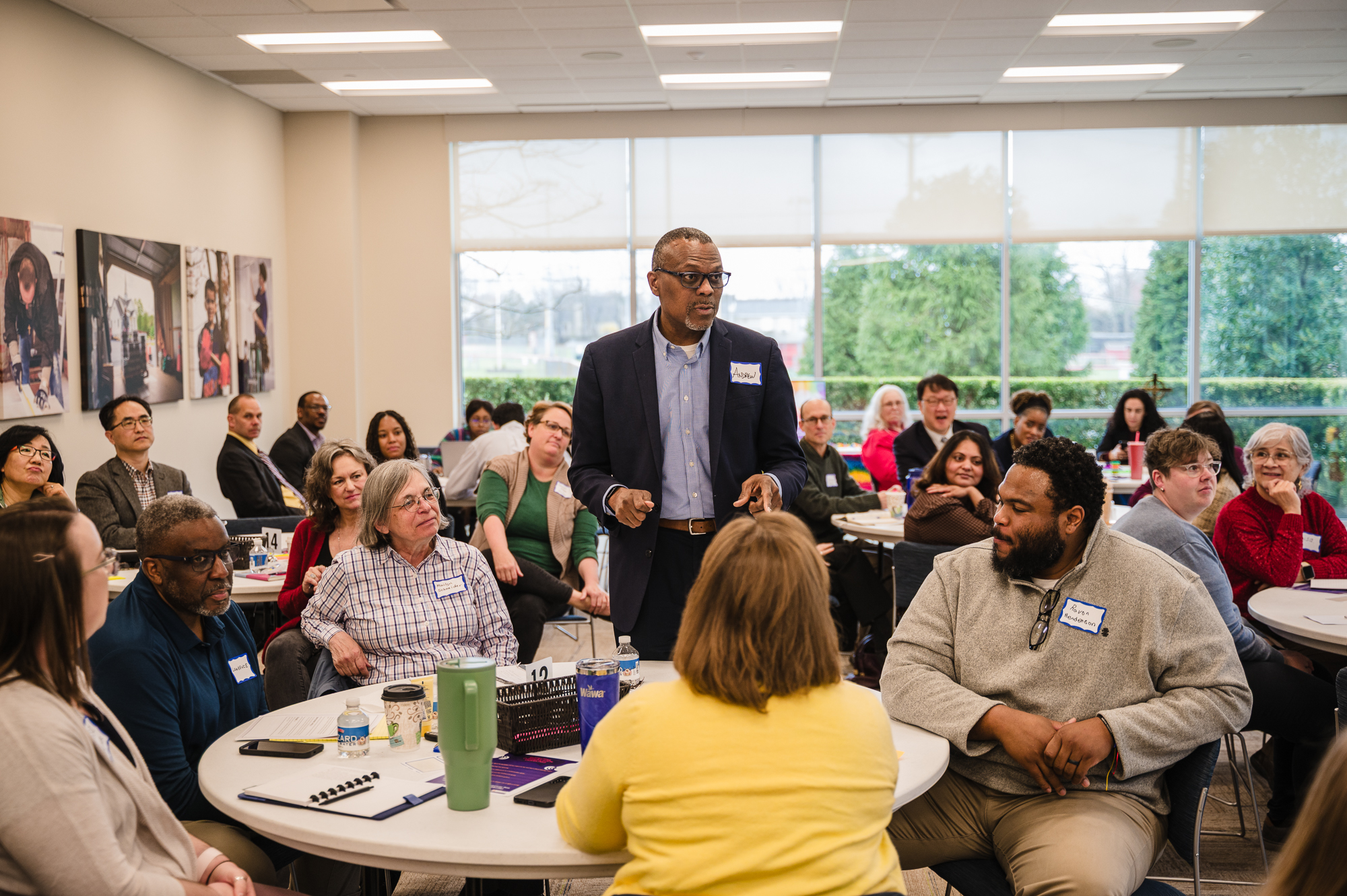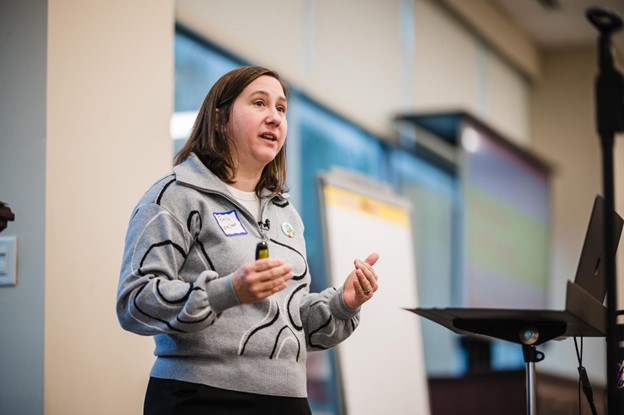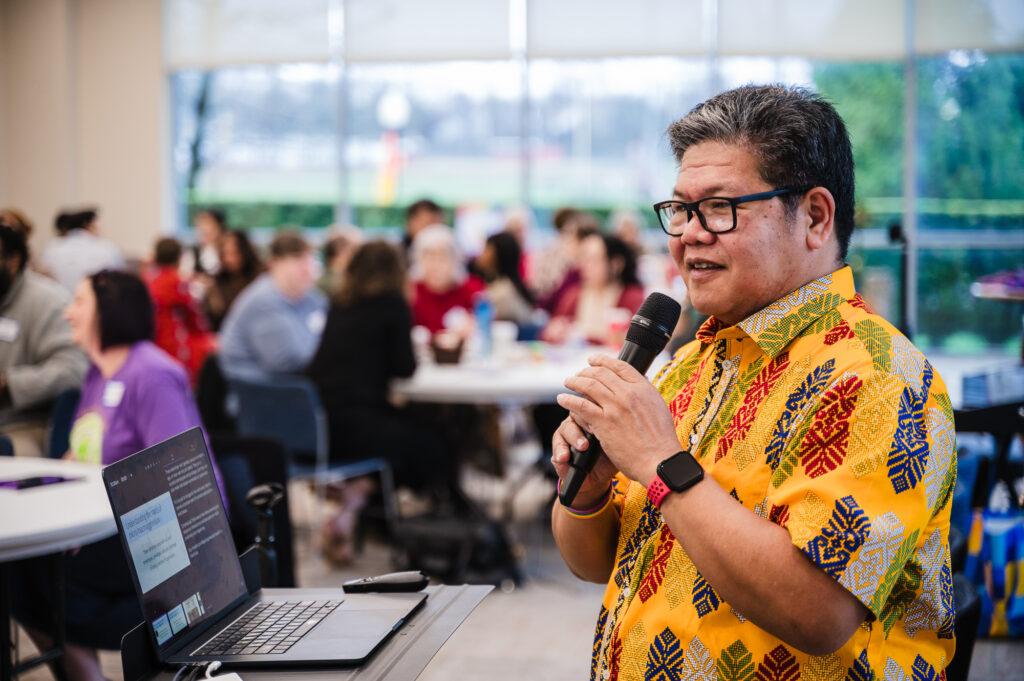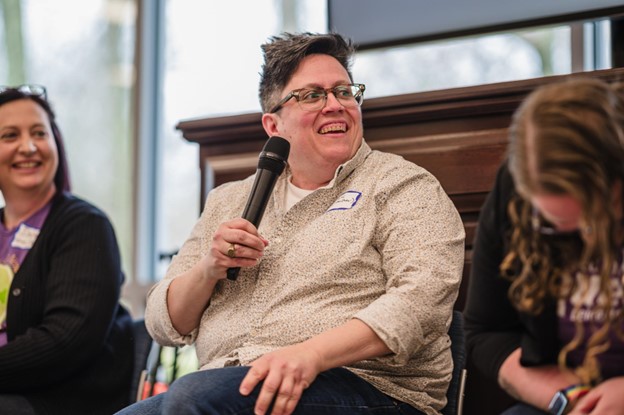
Rain-soaked roads stretched across Eastern Pennsylvania and Greater New Jersey on a Thursday morning in April. Yet more than 90 people—cabinet members, Connectional Table leaders, Board of Ordained Ministry members, and staff—showed up at the Mission and Resource Center in Neptune, NJ for what many described as a historic and holy moment.
It was the first time an annual conference group officially participated in a full-day, in-person training led by the Reconciling Ministries Network (RMN): Welcome! Building Beloved Community: Affirming LGBTQ+ Inclusion.

“This is the first conference group in the denomination to take part in this training,” said Rev. Emily Bagwell, RMN’s Director of Resource Management & Development, as she began the first session of the day.
It was a long-awaited moment—years in the making—and one shaped by hope, courage, and the recognition that true change takes both policy and practice.
A Historic First
The day opened with a welcome from Bishop Cynthia Moore-Koikoi, who grounded the gathering in spirit: “I’ve always said, if our Book of Discipline changes, that would be the easy work. The hard work would be to open hearts and minds to be truly inclusive.”
“It’s not about an issue,” Rev. Bagwell told participants. “It’s about beloved community. It’s about becoming a church where everyone can be their whole selves.”
Covenantal Space
Rev. Dr. Juel Nelson, EPA&GNJ’s Director of Leadership Development, set covenantal ground rules for conversation on the acronym: “RESPECT.” Borrowed from the General Commission on Religion and Race, these guidelines weren’t just procedural—they set the tone for a space that valued empathy, curiosity, and courage.
Participants were asked: What comes naturally to you? What takes effort? What are you willing to try?

From there, the group was invited into deeper waters—led by RMN’s Rev. Dr. Israel “Izzy” Alvaran, who guided Session 1 on recognizing micro- and macro-aggressions.
“We all carry a web of identity, privilege, and potential for oppression,” Rev. Alvaran said. “Our growth comes from acknowledging that and choosing differently.”
Language was examined not as abstract theory but as a pastoral reality. “A single phrase can signal whether someone is safe,” Bagwell explained in Session 2. “We are called to use language that heals, not harms.”
Tables were given time to reflect: Where in your conference, church, or process could a shift in language bring life?
Stories That Heal

In the afternoon, the conversation shifted from concepts to lived experience. A panel of leaders from both conferences—Deaconess Darlene DiDomineck, Rev. Jess Winderweedle, and Rev. Kaleigh Corbett Rasmussen—shared their stories about queer leaders navigating call, trauma, and courage.
“The fortitude, wisdom, and resilience of queer clergy is an untapped resource for the church,” said Rev. Winderweedle, whose dissertation explores queer clergy experiences across mainline denominations.
Rev. Corbett Rasmussen added, “We need brave spaces where stories are heard—not just told.”
DiDomineck reminded the room, “Queer folks aren’t just in clergy roles or reconciling congregations. We are laypeople too, born into every part of our churches.”
Their words stirred the room, and sparked discussions around tangible next steps at the conference level.
Alyssa Ruch, Director of Pathways Bridges, described the conversations as powerful reminders of the spiritual practice of community-building.
“It reinforced the importance of cultivating a culture of storytelling, curiosity, and learning in the work of building beloved community,” she said. “That’s central to what we’re doing in EPA & GNJ through Pathways Bridges—yet another small, intentional step.”
Small, Faithful Steps

The final sessions emphasized the importance of structure and spirit. Participants reflected on how to support LGBTQ+ candidates in ordination and considered RMN’s framework for understanding stages of inclusion.
“We cannot legislate grace,” Rev. Alvaran said. “We cannot legislate relationships. That’s the work of the Holy Spirit.”
Rather than prescribe a one-size-fits-all model, the facilitators encouraged small, faithful steps: foster courageous conversations, build trust, celebrate stories, and—above all—move at the pace of grace.
Rev. Noé Gabriel (Gabe) López, Associate Superintendent of Eastern Pennsylvania, reflected on how the training deepened his awareness of identity and intersectionality.
“What stood out to me was the reminder to be cognizant of the intersections of our identities—how some grant privilege while others lead to marginalization,” he shared. “As a cisgender male and U.S. citizen, I hold certain privileges, yet as a first-generation Guatemalan raised in North Philadelphia, I also navigate complexities that shape my experience and have, many times, marginalized me.”
For Rev. Lopez, the training reinforced the necessity of building a church that remains open and inclusive—not only in its policies but in how it honors the fullness of each person’s story.
Hope for the Future
After the training concluded, Rev. Emily Bagwell shared watching conference leadership actively engage with foundational tools for building a more inclusive and affirming church reaffirmed her belief in the transformative power of such efforts.
“This engagement fuels my hope for the future of the United Methodist Church,” she said. “We have an abundance of gifts to offer the world, and by embracing greater sensitivity and awareness, we will be able to bless countless individuals and make a lasting impact.”
RMN leaders plan to take insights from this training and use them to shape future sessions with other conferences and agencies across the denomination.
Looking Ahead
This will not be the last training of its kind in Eastern Pennsylvania and Greater New Jersey. Conference leaders are already planning future sessions to expand the circle, deepen understanding, and continue the work of building a truly inclusive church.
Rev. Dawn Taylor-Storm, EPA&GNJ Director of Connectional Ministries, summed it up: “It’s one thing to write policy. It’s another to live out our faith. And that’s what today was about.”
As the day came to a close, leaders packed up handouts and unfinished conversations, but many lingered in the hallways, sharing reflections and next steps. The rain had stopped.
And something new had begun.
For over 40 years, Reconciling Ministries Network has been committed to intersectional justice across and beyond the United Methodist connection, working for the full participation of all LGBTQ+ people throughout the life and leadership of the Church.
Learn more about what RMN does in this video, or visit their website.
**Photo credit: Corbin Payne**
